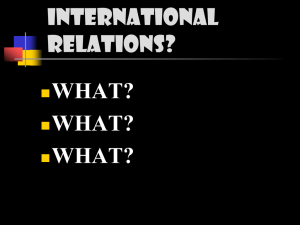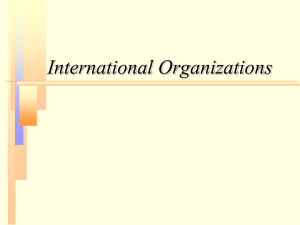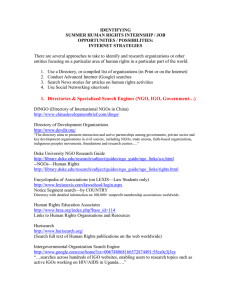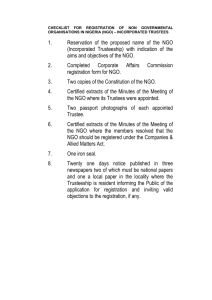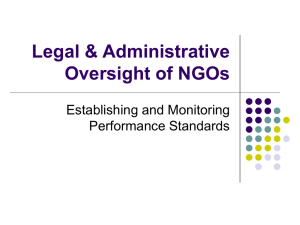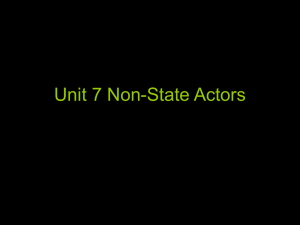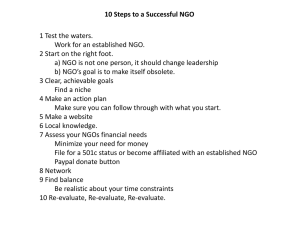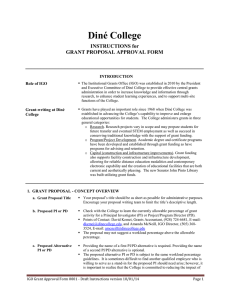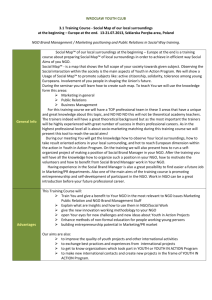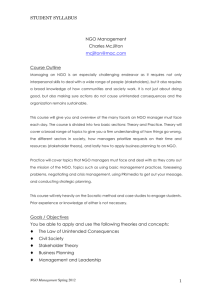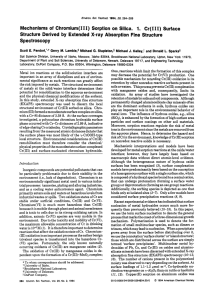Wide definition: International Organization is a union or association
advertisement
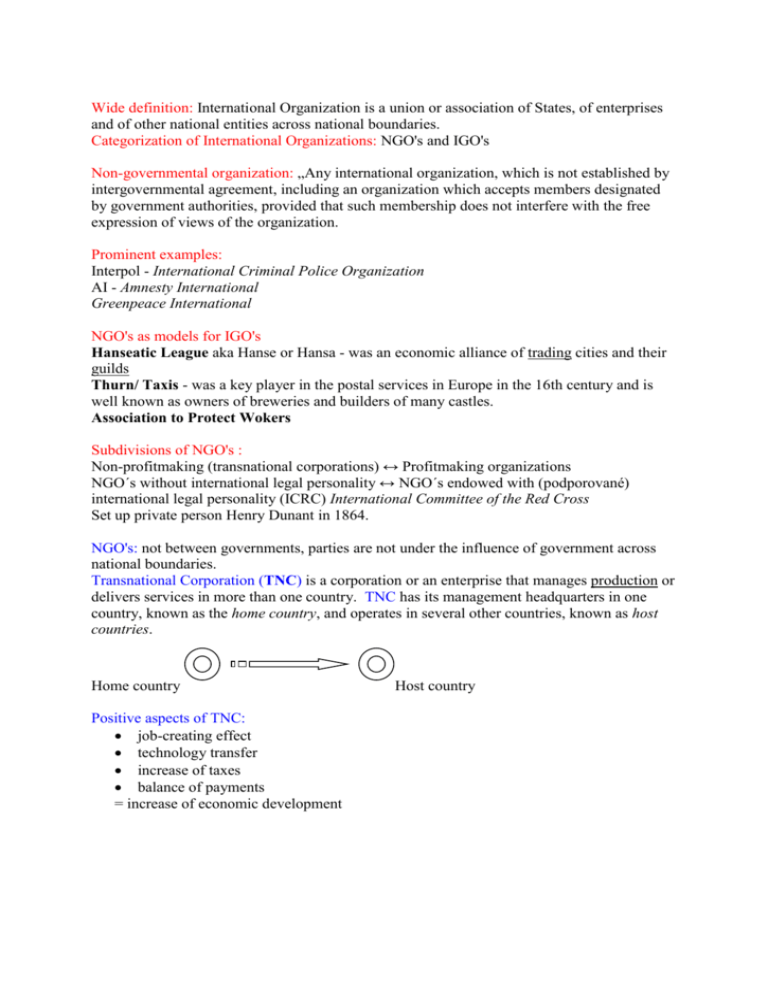
Wide definition: International Organization is a union or association of States, of enterprises and of other national entities across national boundaries. Categorization of International Organizations: NGO's and IGO's Non-governmental organization: „Any international organization, which is not established by intergovernmental agreement, including an organization which accepts members designated by government authorities, provided that such membership does not interfere with the free expression of views of the organization. Prominent examples: Interpol - International Criminal Police Organization AI - Amnesty International Greenpeace International NGO's as models for IGO's Hanseatic League aka Hanse or Hansa - was an economic alliance of trading cities and their guilds Thurn/ Taxis - was a key player in the postal services in Europe in the 16th century and is well known as owners of breweries and builders of many castles. Association to Protect Wokers Subdivisions of NGO's : Non-profitmaking (transnational corporations) ↔ Profitmaking organizations NGO´s without international legal personality ↔ NGO´s endowed with (podporované) international legal personality (ICRC) International Committee of the Red Cross Set up private person Henry Dunant in 1864. NGO's: not between governments, parties are not under the influence of government across national boundaries. Transnational Corporation (TNC) is a corporation or an enterprise that manages production or delivers services in more than one country. TNC has its management headquarters in one country, known as the home country, and operates in several other countries, known as host countries. Home country Positive aspects of TNC: job-creating effect technology transfer increase of taxes balance of payments = increase of economic development Host country Corporate misconduct: International Telephone & Telegraph - participates in global markets including water and fluids management, defense and security, and motion and flow control. ITT financially helped opponents of Salvador Allende's government prepare a military coup in Chile. Organization ITT interfering in internal affairs. → Code of conduct: a set of rules outlining the responsibilities of or proper practices for an individual or organization. There are 6000 non –profit organizations. Prominent examples of NGO´s: Interpol - International Criminal Police Organization It was established in 1923 in Vienna. The organization's headquarters is in Lyon, France Khoo Boon Hui, President Ronald Noble, Secretary General It is the world's largest international police organization, with 188 member countries. It is non-governmental organization, but it is interesting to all crimes between countries possible to change information. Europol - the European Law Enforcement Agency which aims at improving the effectiveness and co–operation of the competent authorities in the Member States in preventing and combating terrorism, unlawful drug trafficking and other serious forms of organised crime. Europol is „IGO“, has more powers, has to arrest criminals, it works more affective. Interpol only informs. It is not intergovernmental organization, but work closely with nation. INTERPOL aims to get investigations over jurisdictional hurdles even when countries do not have diplomatic relations with one another. IACA- The International Anti-Corruption Academy is the world's first educational institution dedicated to fighting corruption. 2009, Vienna AI - Amnesty International - set up in 1960 in London by British lawyer Peter Benenson. Their mission is to conduct research and generate action to prevent and end grave abuses of human rights and to demand justice for those whose rights have been violated. For example, they take action to: Stop violence against women, Abolish the death penalty, Oppose torture and combat terror with justice, Free prisoners of conscience, Protect the rights of refugees and migrants, Regulate the global arms trade. Greenpeace International Greenpeace is a non-governmental environmental organization with offices in over 40 countries and with an international coordinating body in Amsterdam, NetherlandsThe organization itself dates its birth to the first protest of 1971, when the newly founded Don't Make a Wave Committee sent a chartered ship for the protest, from Vancouver to oppose United States testing of nuclear devices in Amchitka, Alaska. IGO's: Associations of States established by and based upon ( založené na) a treaty (dohode), which pursues common aims and which has its own special organs to fulfil particular functions within the organizations. Elements of the definition: Association of States T State entity consists of territory, government and population. G P Somalia is a failed state- having failed at some of the basic conditions and responsibilities of a sovereign government. A central government so weak or ineffective that it has little practical control over much of its territory; non-provision of public services; widespread corruption and criminality; refugees and involuntary movement of populations; and sharp economic decline Treaty (Charter, Constitution, Statue, Pact) Common aims peace / technical organization Own special organs: their structure Assemblage - large organ of representation - all members of conference - policy - meeting once a year Council - small executive organ - more often meetings - sometimes permanently Secretariate – paperwork, Secretary NGO's can be a model for IGO's The private persons have a good ideas fot IGO's. Hanseatic League aka Hanse or Hansa - was an economic alliance of trading cities and their guilds Thurn/ Taxis = UPU the Universal Postal Union, Established in 1874, Association to Protect Wokers = ILO the International Labour Organization, 1919 ILO: governments, employers and employee Categories: Universal ↔ regional Peace keeping ↔ technical traditional ↔ supranational general ↔ special Regional IGO Culture of Europe, European Economic Area (EEA) The African Union (consisting of 53 African states) Mercosur or Mercosul (an economic and political agreement between Argentina, Brazil, Paraguay and Uruguay.) The Andean Pact is one of the world's oldest free trade movements. It was founded in 1969 The member countries—Venezuela, Colombia, Ecuador, Peru, and Bolivia Asia: The Association of Southeast Asian Nations (ASEAN) Geo-political and economic organization of 10 countries located in Southeast Asia, which was formed on 8 August 1967 by Indonesia, Malaysia, the Philippines, Singapore and Thailand.[ Asia-Pacific Economic Cooperation (APEC) is a forum for 21 Pacific Rim countries that seeks to promote free trade and economic cooperation throughout the Asia-Pacific region. Established in 1989 The North Atlantic Treaty Organization or NATO is an intergovernmental military alliance based on the North Atlantic Treaty which was signed on 4 April 1949. traditional ↔ supranational minority majority rules veto binding law no courts enforce a law by courts EU general ↔ special general - all states can fulfil function (trade, peace, environment) special – only a few states can fulfil purpose OPEC The Organization of the Petroleum Exporting Countries is a cartel of twelve developing countries. OPEC has maintained its headquarters in Vienna since 1965 Membership: No open IGO, admission United Nations (UN) is an international organization whose stated aims are facilitating cooperation in international law, international security, economic development, social progress, human rights, and achievement of world peace. - membership in the UN is open to all other peace-loving states that accept the obligations contained in the present Charter - The admission of any such state to membership in the UN will be effected by a decision of the General Assembly upon the recommendation of the Security Council. 2/3 majority EU- is an economic and political union of 27 member states 1993 The Copenhagen criteria are the rules that define whether a country is eligible to join the EU (stable democracy that respects human rights and the rule of law, a functioning market economy capable of competition within the EU International personality means capacity to be a bearer of rights and duties under international law. Any entity which possesses international personality is an international person or a subject of international law. The Bernadotte case – On 17 September 1948, Bernadotte a Swedish national, was killed allegedly by a private gang of terrorists. He was a chief UN Truce Negotiator in the area. In the course of deciding what action to take in respect of his death, the UNGA sought the advice of the IC of justice. Israel was admitted to the UN shortly after Court gave it opinion.

